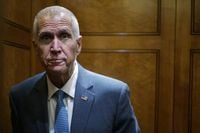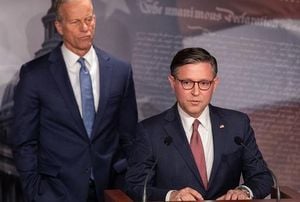On September 3, 2025, the already tense atmosphere surrounding the Federal Reserve Board reached a boiling point as two key Republican senators, Thom Tillis of North Carolina and Mike Rounds of South Dakota, made it clear they would not consider a replacement for recently fired Federal Reserve Governor Lisa Cook until her legal challenge against President Donald Trump’s decision is resolved in court. Their stance has thrown a wrench into the administration’s plans and raised fundamental questions about the independence of America’s central bank, the limits of executive authority, and the future of monetary policy in the United States.
Lisa Cook, who was appointed to the Federal Reserve Board by former President Joe Biden, found herself abruptly ousted by President Trump last week. The stated reason? Allegations of mortgage fraud. However, Cook’s lawyer has categorically denied these claims, and Cook herself wasted no time in filing a lawsuit to block the move. According to CNBC, this legal battle could eventually make its way to the Supreme Court, underscoring the high stakes and the unprecedented nature of the situation.
Senator Thom Tillis, a senior member of the Senate Banking, Housing and Urban Affairs Committee, was unequivocal in his position. “I’m not going to consider anybody until that’s been adjudicated,” Tillis told reporters on Capitol Hill, as first reported by Politico. He added, “I’m going to leave it to the courts to decide whether or not it’s legal.” Tillis, who is retiring after this term, also expressed skepticism about the grounds for Cook’s removal. “But if in fact it is to be for cause, it’s dubious whether or not—even if these events are as they’ve been described—they’re a basis for cause,” he said. He was adamant that the Federal Reserve should not become a political football, warning, “If it’s a move to really kind of create a partisan divide in the Fed, then I’m against it on that basis.”
Senator Mike Rounds echoed these concerns. Speaking to CNBC, Rounds emphasized that Cook “is still in the position, she has not had due process yet.” When pressed on whether he would support a replacement for Cook in committee, Rounds demurred, saying, “I don't get to make the decision on what comes up before the committee, so at this point, it's hypothetical.” He added, “She is still a member of the board, and you know the president most certainly has the right to try to influence and to lobby, but at this stage of the game, there's no change in her status.”
The Senate Banking Committee, where these decisions are hashed out, is currently under narrow Republican control, holding a 13-11 majority. But with Tillis and Rounds withholding their support, any nomination to replace Cook would be deadlocked, unable to advance. As reported by multiple outlets, including Politico and Seeking Alpha, this means the administration’s hands are tied until the courts resolve Cook’s lawsuit.
The circumstances of Cook’s firing are, to put it mildly, highly unusual. Presidential firings of Federal Reserve governors are extremely rare, and the legal basis for such an action is hotly contested. According to Politico, Tillis was particularly wary of any move that would bring the Fed under direct control of the executive branch, stating, “I have no interest in moves that would make the Fed really come under direct control of the executive branch.” He stressed the importance of maintaining the central bank’s independence, a sentiment echoed by many economists and policymakers across the political spectrum.
Meanwhile, the legal process grinds on. The court hearing on Cook’s lawsuit ended last week without resolution, leaving her status in limbo. If Cook had been replaced before the courts ruled on her case, it would have put additional pressure on her to step down, potentially setting a precedent for future executive overreach. Instead, as things stand, she remains in her position, albeit under a cloud of uncertainty.
The political ramifications extend beyond Cook herself. On September 4, 2025, the Senate Banking Committee is set to consider Stephen Miran’s nomination to take over the seat of another Fed governor, Kugler. Miran, in his written testimony, has argued for the importance of Fed independence. Yet, as The Wall Street Journal notes, his prior role as a Trump economic spokesman has led some to question whether he would truly resist political pressure. The optics are not lost on anyone watching the drama unfold in Washington.
For the Biden-appointed Cook, the stakes are personal and professional. Her lawsuit not only challenges her own firing but could set a lasting precedent about the limits of presidential authority over the Federal Reserve. According to The New York Times, the outcome could shape the boundaries of central bank independence for years—if not decades—to come.
The broader context adds another layer of complexity. The Federal Reserve, long regarded as a bastion of technocratic expertise and political neutrality, has increasingly found itself in the crosshairs of partisan battles. The current episode has only intensified fears that the central bank could become subject to the same political pressures that have roiled other institutions in recent years. As Senator Tillis put it, any move to “create a partisan divide in the Fed” would be deeply damaging to the institution’s credibility and effectiveness.
Notably, the allegations of mortgage fraud that triggered Cook’s firing have been flatly denied by her legal team. According to CNBC, Cook’s lawyer insists there is no factual basis for the claims, raising further questions about whether the firing was truly for cause or politically motivated. Tillis, for his part, seemed unconvinced that the alleged events, even if true, would justify such a drastic step.
As the legal and political drama unfolds, the future of the Federal Reserve—and of Lisa Cook’s career—hangs in the balance. The case has already attracted national attention, not only for its immediate impact on monetary policy but for what it reveals about the state of American governance. With the courts now holding the key to Cook’s fate, all eyes are on the next legal developments.
In the coming weeks, the Senate Banking Committee will continue to play a pivotal role. Without the support of senators like Tillis and Rounds, any Trump nominee to replace Cook will remain stalled. The committee’s narrow majority means that even a single defection can grind the process to a halt. Until the courts issue a definitive ruling, the uncertainty will linger—casting a long shadow over the central bank and the broader economy.
For now, at least, the principle of Federal Reserve independence has found unlikely defenders in the Senate’s Republican ranks. Whether that principle holds in the face of mounting political pressure remains to be seen, but one thing is certain: the battle over Lisa Cook’s seat is far from over, and its outcome could reshape the Federal Reserve for years to come.




